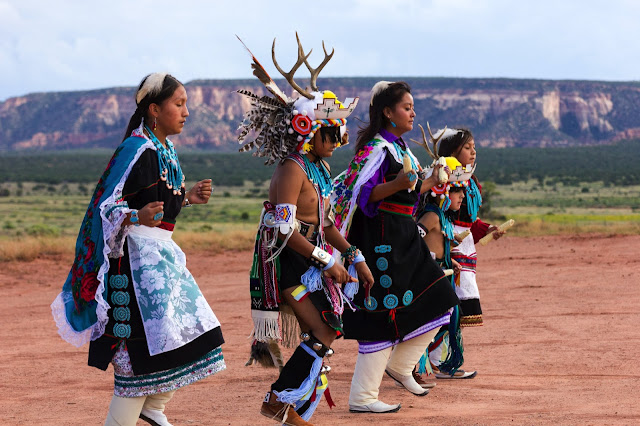Double trouble: Yankton Sioux Tribe swears in new chairman, but former leader isn’t leaving
Published in Native Sun News in 2011. For more on topics like this, see my book, American Apartheid: The Native American Struggle....
Applause and a
constitutional crisis broke out as Ida Ashes, the new vice-chairwoman of the
Yankton Sioux Tribe, was sworn into office on Wednesday, September 14, during a
meeting of the tribe’s General Council. Two minutes later, at 3:32 pm central
time, Ashes swore in the new chairman, Thurmond Cournoyer (shown here). Both had won their
offices in a landslide during the tribe’s September 1 biennial election.
By swearing in the new officers, the
Ihanktonwan, whose ruling government body is the entire voting membership of
the community, asserted the supremacy of their General Council. Under the
Yankton’s non-Indian Reorganization Act constitution, the large group runs the
show, but delegates day-to-day business to a smaller group, the Business and
Claims Committee (B&C), composed of the tribal chair, vice-chair,
secretary, treasurer, and five members who are elected at large.
In
recent years, the B&C under outgoing chairman Robert Cournoyer has assumed
increasing authority, and the General Council was fed up and wanted to seat his
successor as soon as possible. “No way,” said Robert Cournoyer. “I don’t take
kindly to being pushed out. There are issues I’m working on, and I plan to be
at my desk until my last day in office.” In any case, September 30 is the usual
date for the handover of power, he said.
Incoming
chair Thurmond Cournoyer disputed
this, saying new officers may be sworn at in any time in September, at the
pleasure of the General Council. “On numerous other occasions newly elected
officers of the B & CC have been sworn in immediately upon certification of
the election results,” he said.
Tribal
member Izzy Zephier asked a few former officials when they had taken office. “They
each remembered taking their oaths a day or two after being voted in,” he said.
The
applause had barely died down on September 14 before rumors began flying about
a “takeover” of the tribal offices, presumably by the new administration’s
supporters, who have expressed particular dissatisfaction with Robert Cournoyer’s
determination to eke out a few more weeks in office and, during that time, find
a way to pay himself and fellow officials severance for being voting out of
office.
“There’s
a precedent,” said Robert Cournoyer. “Our outgoing officers have received
severance since 1988. Other tribes pay it as well.” It was not clear where the
tribe would get the money, which may amount to as much as $100,000 to be shared
among the nine exiting B&C members.
“Several
of our programs, such as Housing, need to reimburse the tribe for bills it paid
on their behalf,” Robert Cournoyer said. “There are sizeable chunks owed the
tribe. But it’s not up to me; it’s up to our treasurer, Leo O’Connor, to figure
it out.”
The
gossip about the purported “takeover” morphed and escalated, seemingly via
Facebook and text message, according to several tribal members. On Thursday, this
reporter was told that a caravan—and then busloads—of armed elders were headed
for the tribal offices, which are in the administration building of Marty
Indian School. There
never existed even a mention of such a thing—of taking over anything, of even
traveling to the tribal offices,” said Thurmond Cournoyer.
Nevertheless,
Robert Cournoyer put police and school security guards on alert and ordered
that the school’s doors be locked, so students could go neither in nor out. One
child was locked out of the school, according to tribal member and community
leader Sharon Drapeau, and had to take refuge at a teacher’s home.
The
“lockdown” reportedly upset parents. It infuriated Drapeau. “It was such a
terrible and upsetting lie,” she said, her voice shaking with anger. “The idea
that we grandparents could be accused of doing anything—anything!—to frighten
or endanger our takojas is horrible. It’s outrageous!”
After
about an hour and a half, nothing resembling an insurrection by senior
citizens, or anyone else, had materialized, and the doors were unlocked,
according to the school’s facilities manager. “Things were quickly back to
normal and continue to be perfectly normal today [Friday],” he said.
Controversies
over the severance payments continue, however. The tribe’s constitution
requires that the General Council approve all compensation for B&C
officials. “We did not approve the severance payments, which are not budgeted,”
Drapeau said. “We certainly can’t waste funds like that.”
Said
Thurmond Cournoyer, who campaigned on a platform that included curbing wasteful
spending and transparency for government actions: “The tribe is in dire
financial straits, and we need to protect our assets from imprudent actions
such as the unauthorized severance payments.”
He
also expressed dismay over the lame-duck B&C’s recent firing of the tribe’s
chief judge. In terminating the jurist, Robert Cournoyer’s administration
nullified tribal-court decisions made after August 26, 2011. “I’m
very concerned that the outgoing B&C is trying to manipulate our judicial
system for its own ends,” said Thurmond Cournoyer. “We must all respect our
laws.” He called the manner in which the firing took place illegal under the
tribe’s constitution and supported the General Council’s recent decision to
reinstate the judge for 90 days. For
his part, Robert Cournoyer described the termination as a valid personnel
action.
For
years, ordinary Yanktons have worried about an increasingly imperial B&C. “In
Ihanktonwan territory, we desperately need transparency,” said Drapeau. “We
need to know what our officials are doing. The B&C usually met in ‘executive
session,’ which meant no one knew what was going on. When we asked for minutes,
they were rarely provided.”
When
Thurmond Cournoyer does take over, presumably on September 30, one of his first
actions will be to order an audit of the tribe’s books, he said. In an open
letter to tribal members, he vowed to protect them “from waste,
misappropriation and oppression by their own officials [as well as] from oppression
by outside entities that are continually attempting to circumvent our
sovereignty and treaty rights.”
He
ended his letter, “I truly expect and desire that the Ihanktonwan Oyate will
begin to work together again as our ancestors did for the best interest of all
and not just a few.”
Text and photograph c. Stephanie Woodard.
Text and photograph c. Stephanie Woodard.

